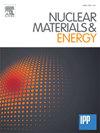Post-mortem analysis of the deposit layers on the lower divertor after the 2023 high particle fluence campaign of WEST
IF 2.3
2区 物理与天体物理
Q1 NUCLEAR SCIENCE & TECHNOLOGY
引用次数: 0
Abstract
We analysed deposits collected on the lower divertor of WEST after the first high fluence campaign performed in 2023. Deposits were collected on the high field side (thick deposition area) of 2 ITER-grade plasma facing units (PFUs), located on different toroidal positions. Using focused ion beam cross sectioning, the deposits were found to be very thick (12–55 µm). A significant difference was observed in the toroidal direction with thicker deposits for the PFU located at the maximal heat load in the inner side, showing a deposition pattern due to the toroidal magnetic field modulation. Deposits present a complex layer-by-layer structure with dense layers, some melted parts and porosities within the layers. The deposition is mainly composed of tungsten with oxygen, boron, carbon and traces of nitrogen whose composition vary along the radial direction. We identified W-rich deposits in the high plasma flux area near the inner strike point and deposits rich in O, B, C and N in the low plasma flux area further away from this strike point. W dense layers of about 5 up to 40 µm thick in the thick deposit area near the strike point were attributed to the high fluence campaign. Pure boron layers resulting from wall conditioning and processed by plasma wall interactions were also observed.
WEST 2023 年高粒子流活动后对下部分流器沉积层的事后分析
我们分析了在 2023 年进行的第一次高通量活动之后在 WEST 下部分流器上收集到的沉积物。沉积物是在位于不同环形位置的两个热核实验堆级等离子体面单元(PFU)的高场侧(厚沉积区)收集的。通过聚焦离子束横截面分析,发现沉积物非常厚(12-55 微米)。在环形方向上观察到了明显的差异,位于内侧最大热负荷处的 PFU 沉积物更厚,显示了环形磁场调制导致的沉积模式。沉积物呈现复杂的逐层结构,有致密层、一些熔化部分和层内孔隙。沉积物主要由钨、氧、硼、碳和微量氮组成,其成分沿径向变化。我们在内侧撞击点附近的高等离子体通量区发现了富含 W 的沉积物,而在远离该撞击点的低等离子体通量区则发现了富含 O、B、C 和 N 的沉积物。在靠近撞击点的厚沉积区内,厚度约为 5 至 40 微米的 W 致密层归因于高通量活动。此外,还观测到了由等离子体壁相互作用产生的壁面调节和处理的纯硼层。
本文章由计算机程序翻译,如有差异,请以英文原文为准。
求助全文
约1分钟内获得全文
求助全文
来源期刊

Nuclear Materials and Energy
Materials Science-Materials Science (miscellaneous)
CiteScore
3.70
自引率
15.40%
发文量
175
审稿时长
20 weeks
期刊介绍:
The open-access journal Nuclear Materials and Energy is devoted to the growing field of research for material application in the production of nuclear energy. Nuclear Materials and Energy publishes original research articles of up to 6 pages in length.
 求助内容:
求助内容: 应助结果提醒方式:
应助结果提醒方式:


